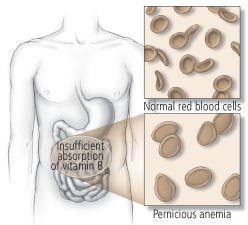The B12 vitamin has an extremely intricate relationship with the body’s chemical balances and thus its healthy function. There are a number of ways in which it protects and supports a variety of chemical interactions necessary for a normal quality of living and even survival. This short guide will introduce you to the basics of B12 chemical functions.
1) Vitamin B12 Regenerates Folic Acid
Without B12, folic acid (B9) becomes trapped in the body in a metabolically useless form. Folic acid is a necessary component in cell division and formation of new cells.
2) Healthy Red Blood Cells Depend on Vitamin B12 Driven Synthesis of DNA. Without usable B12 in the system, the DNA synthesis begins to shut down, resulting in pernicious/megaloblastic anemia. Symptoms of this illness include fatigue, Low energy levels, nausea and diarrhea, decreased appetite, weakening of the muscles, headaches, tingling sensations and a sore tongue.
3) Vitamin B12 Supports Synthesis of the Amino Acid Methionine and Amino Acid “SAM-e”
Methionine is one of the two sulfur based compounds involved in metabolic functions. It is a crucial building block of proteins necessary for a state of a healthy body. SAM-e is involved in over 100 enzymatic reactions required for normal metabolic activity.
5) Vitamin B12 Promotes Activity of Hormones and Neurotransmitters Affecting Your Mood
The hormones include dopamine, serotonin and melatonin. These particular neurotransmitters are necessary for a healthy balanced mood, emotional state and even the sleeping cycle. An imbalance in either the levels or the function of any of these can result in a depression which is likely to need medicating.
6) Vitamin B12 Helps Reduce Dangerous Levels of Homocysteine Homocysteine is a toxic amino acid (protein) associated with a number of different negative side effects in the body. High homocysteine levels can cause any of the following symptoms: tinnitus, anxiety, increased heart beat, worsening symptoms of thyroid disorders, depression and body toxicity. Individuals with high homocysteine levels are at risk for cardiovascular problems.
7) Vitamin B12 Benefits Help Prevent Irreversible Neurological Impairment Peripheral and central nervous system deterioration can occur due to a vitamin B12 deficiency. Vitamin B12 deficiency has been linked to demyelination of the nerve and the onset of Alzheimer’s disease and dementia.

 Research from the Institute for Noise Hazards Research and Evoked Potentials Laboratory at Chaim-Sheba Medical Center in Ramat Gan and from Tel Aviv University, both in Israel, looked at a group of 385 people with tinnitus and found that 36 to 47 percent suffered from vitamin B12 deficiency. All of the people low in B12 received injections of 1,000 micrograms weekly for four to six months. At the end of that time, their hearing and tinnitus were evaluated. Fifty-four percent reported improvement in their tinnitus, and approximately one-fourth reported reductions in the measured loudness of their tinnitus.
Research from the Institute for Noise Hazards Research and Evoked Potentials Laboratory at Chaim-Sheba Medical Center in Ramat Gan and from Tel Aviv University, both in Israel, looked at a group of 385 people with tinnitus and found that 36 to 47 percent suffered from vitamin B12 deficiency. All of the people low in B12 received injections of 1,000 micrograms weekly for four to six months. At the end of that time, their hearing and tinnitus were evaluated. Fifty-four percent reported improvement in their tinnitus, and approximately one-fourth reported reductions in the measured loudness of their tinnitus.